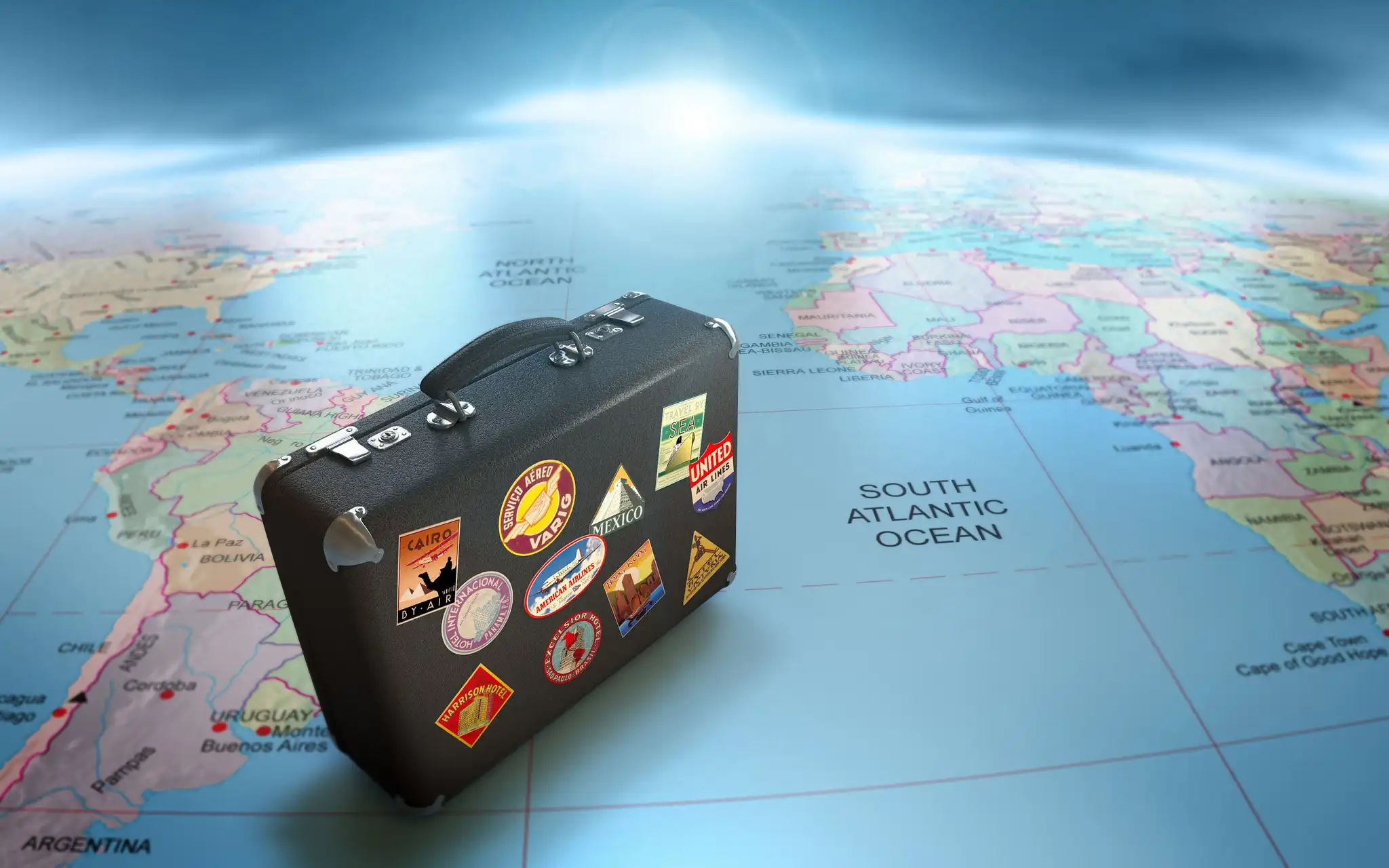Becoming a travel nanny is an exciting and rewarding career path that combines the joys of childcare with the thrill of exploring new destinations. If you’re passionate about working with children, love to travel, and want to turn your wanderlust into a profession, this guide will walk you through everything you need to know about becoming a successful travel nanny .
What is a Travel Nanny?
A travel nanny is a childcare professional who accompanies families on vacations, business trips, or extended stays abroad. Unlike traditional nannies who work in a fixed location, travel nannies are adaptable, resourceful, and skilled at managing the unique challenges of caring for children in unfamiliar environments.
Travel nannies often take on responsibilities such as organizing activities, ensuring safety during excursions, and helping children adjust to new cultures. They may also assist with light household tasks like packing, unpacking, and meal preparation while traveling. The role requires flexibility, patience, and a deep understanding of child psychology, making it ideal for individuals who thrive in dynamic settings.
The Role of a Travel Nanny
As a travel nanny , your primary responsibility is to provide high-quality care for children while traveling. This includes:
- Supervising playtime and educational activities.
- Ensuring children adhere to routines, even in changing environments.
- Managing logistics such as transportation, accommodations, and meals.
- Acting as a cultural guide by introducing children to local customs and traditions.
Your prsence allows parents to focus on their work or relaxation, knowing their children are safe and entertained.
Why Choose a Career as a Travel Nanny?
1. Adventure and Exploration
One of the most appealing aspects of being a travel nanny is the opportunity to see the world. From bustling cities to serene beaches, you’ll have the chance to explore diverse landscapes and immerse yourself in different cultures—all while earning a living. Imagine spending months in Paris, teaching children French phrases, or hiking through New Zealand’s breathtaking mountains with your charges.
Diverse Destinations
Each destination offers unique experiences, whether it’s tasting exotic foods, learning traditional dances, or participating in local festivals. For example:
- In Thailand, you might teach children how to cook authentic Pad Thai or participate in Loy Krathong, a festival where floating lanterns are released onto rivers.
- In Italy, you could visit historic landmarks like the Colosseum or Vatican City, turning every outing into an educational adventure.
- In Australia, outdoor enthusiasts can enjoy snorkeling in the Great Barrier Reef or camping under the stars in the Outback.
These experiences not only enrich your life but also create lasting memories for the children in your care.
Cultural Immersion
Living temporarily in another country allows you to delve deeper into its culture than typical tourists. You’ll gain firsthand knowledge of local customs, languages, and traditions, which enhances your ability to connect with people from all walks of life. This immersion fosters personal growth and broadens your perspective on global issues.
2. Professional Growth
Working as a travel nanny allows you to develop valuable skills such as adaptability, problem-solving, and cross-cultural communication. These skills can enhance your resume and open doors to other career opportunities in childcare, education, or hospitality. For example, many former travel nannies transition into roles as family consultants, educators, or even entrepreneurs in the travel industry.
Skill Development
Here are some key skills you’ll hone as a travel nanny :
- Adaptability : Every day brings new challenges, from navigating foreign airports to adjusting to time zone changes. Learning to adapt quickly prepares you for unpredictable situations.
- Problem-Solving : Whether it’s calming a homesick child or finding alternative activities due to bad weather, your ability to think critically and act decisively will improve over time.
- Cross-Cultural Communication : Interacting with families and locals from various backgrounds sharpens your communication skills and teaches you to navigate cultural nuances effectively.
Career Advancement
The experience gained as a travel nanny sets you apart in competitive job markets. Employers value candidates who demonstrate independence, initiative, and a global mindset. Additionally, networking within the industry can lead to lucrative opportunities, such as private placements with high-profile clients or leadership roles in international organizations.
3. Building Meaningful Relationships
As a travel nanny , you’ll form close bonds with the families you work for and the children under your care. Many nannies describe these relationships as some of the most fulfilling parts of their careers. Children often view their nannies as mentors and friends, and parents appreciate having someone they trust to share the journey with them.
Emotional Connections
The intimacy of daily interactions creates strong emotional ties. For instance:
- You might become a confidant for shy or anxious children, helping them build confidence and resilience.
- Parents rely on you to maintain consistency and structure, allowing them to relax knowing their children are in capable hands.
- Over time, you may be invited to family celebrations, holidays, or milestone events, further solidifying your place in their lives.
Long-Term Impact
Your influence extends beyond the duration of your assignment. By fostering curiosity, kindness, and respect, you shape the way children perceive the world. Former charges often remember their travel nannies fondly, crediting them with instilling lifelong values and inspiring future aspirations.
4. Flexibility
While the role requires dedication, it also offers flexibility. You can choose assignments based on your preferences, whether you prefer short-term gigs or long-term commitments. For instance, you might opt for seasonal work during summer vacations or commit to a year-long position with a family relocating overseas.
Customizing Your Schedule
Unlike traditional 9-to-5 jobs, travel nanny positions allow you to tailor your workload to fit your lifestyle. Some options include:
- Short-Term Assignments : Ideal for those seeking variety or testing the waters before committing to longer contracts.
- Seasonal Work : Perfect for students or individuals looking to supplement income during specific times of the year.
- Long-Term Placements : Suitable for experienced nannies desiring stability and deeper connections with families.
Work-Life Balance
Flexibility also means you can prioritize personal goals alongside professional ones. Use downtime between assignments to pursue hobbies, travel independently, or invest in self-improvement. This balance ensures you remain energized and motivated throughout your career.
5. Financial Stability
Although salaries vary depending on factors like location, experience, and contract terms, many travel nannies enjoy competitive compensation packages. In addition to base pay, benefits may include free accommodation, meals, transportation, and bonuses. For example, some families offer stipends for sightseeing or cover expenses related to visas and vaccinations.
Competitive Salaries
On average, travel nannies earn between $30,000 and $60,000 annually. However, top-tier candidates working with affluent families or in high-demand regions can command higher rates. Factors influencing salary include:
- Years of experience
- Specialized training (e.g., special needs care)
- Language proficiency
- Reputation and references
Cost Savings
Living abroad often reduces living costs compared to major metropolitan areas in your home country. For instance:
- Rent-free accommodations provided by host families eliminate housing expenses.
- Shared meals with the family reduce grocery bills.
- Access to public transportation or company cars minimizes commuting costs.
By maximizing earnings and minimizing expenditures, you can save significantly for future endeavors, such as buying property, starting a business, or funding additional education.
Essential Qualifications for Becoming a Travel Nanny
To succeed as a travel nanny , certain qualifications and attributes are essential. Here’s what you’ll need:
1. Relevant Experience in Childcare
Families hiring a travel nanny typically look for candidates with prior experience in childcare. This could include babysitting, working in daycare centers, teaching, or serving as a full-time nanny. Highlight any certifications or training programs you’ve completed, such as CPR/First Aid certification or courses in early childhood development.
If you’re just starting out, consider gaining experience through volunteer work or internships. Many organizations, such as summer camps or community centers, welcome volunteers eager to learn and contribute. Document your achievements and gather references from supervisors or parents to strengthen your profile.
Building a Strong Foundation
Begin by volunteering at local schools, libraries, or after-school programs. These environments expose you to diverse age groups and behavioral patterns, equipping you with practical skills. For example:
- Working at a preschool teaches you how to manage large groups of energetic toddlers.
- Assisting teachers provides insight into curriculum planning and classroom management.
- Babysitting gives you one-on-one experience catering to individual needs and preferences.
Gathering References
References serve as testimonials of your abilities and character. When requesting recommendations, choose individuals who can speak to your reliability, professionalism, and rapport with children. Examples include:
- Parents of children you’ve cared for
- Teachers or administrators from educational institutions
- Co-workers or supervisors from previous childcare roles
Ensure references highlight specific instances where you demonstrated excellence, such as resolving conflicts peacefully or organizing engaging activities.
2. Strong Communication Skills
Effective communication is crucial when working with both children and their parents. As a travel nanny , you’ll need to clearly convey information, set expectations, and address concerns promptly. This involves not only verbal communication but also active listening and empathy.
For example, if a child feels homesick during a trip, your ability to listen attentively and offer reassurance can make all the difference. Similarly, maintaining open lines of communication with parents ensures everyone remains aligned regarding schedules, routines, and behavioral guidelines.
Verbal and Nonverbal Communication
Developing strong verbal and nonverbal communication skills enhances your effectiveness as a caregiver. Tips include:
- Using clear, concise language when giving instructions or explaining rules.
- Paying attention to body language, tone of voice, and facial expressions to gauge emotions accurately.
- Practicing active listening by paraphrasing what others say to confirm understanding.
Conflict Resolution
Conflicts inevitably arise, whether it’s sibling rivalry or disagreements over bedtime routines. Equip yourself with strategies to mediate disputes fairly and constructively. Techniques include:
- Encouraging open dialogue to express feelings and perspectives.
- Setting boundaries and enforcing consequences consistently.
- Modeling respectful behavior to promote positive interactions.
3. Adaptability and Problem-Solving Abilities
Travel comes with its share of surprises, from delayed flights to unexpected illnesses. A good travel nanny remains calm under pressure and finds creative solutions to challenges. Whether it’s improvising an activity due to bad weather or navigating a foreign city without GPS, adaptability is key to thriving in this role.
To hone these skills, practice thinking on your feet and developing contingency plans for various scenarios. For instance, always carry a backup itinerary or research alternative attractions in case Plan A falls through.
Staying Calm Under Pressure
Remaining composed during stressful situations reassures both children and parents. Strategies to stay calm include:
- Taking deep breaths and counting to ten before reacting.
- Focusing on solutions rather than dwelling on problems.
- Drawing upon past experiences to inform decision-making.
Creative Problem-Solving
Creativity enables you to transform obstacles into opportunities. For example:
- Turn rainy days into indoor scavenger hunts or craft sessions.
- Convert layovers into mini-adventures by exploring airport amenities.
- Transform cramped quarters into cozy forts using blankets and pillows.
4. Cultural Sensitivity
When traveling internationally, understanding cultural norms and customs is vital. Demonstrating respect for local traditions helps ensure smooth interactions and enriches the experience for everyone involved. Before embarking on a trip, familiarize yourself with basic etiquette, greetings, and taboos specific to the region.
Cultural sensitivity also extends to dietary restrictions, religious practices, and social behaviors. By showing genuine interest in the local culture, you’ll not only earn the trust of the family but also create meaningful learning opportunities for the children.
Researching Cultures
Before arriving at a new destination, conduct thorough research to avoid unintentional offenses. Resources include:
- Travel guides and blogs written by locals or expats.
- Online forums and social media groups discussing regional customs.
- Documentaries and films showcasing authentic portrayals of daily life.
Teaching Cultural Awareness
Use your knowledge to educate children about diversity and inclusion. Activities might involve:
- Learning simple phrases in the local language.
- Participating in traditional ceremonies or festivals.
- Sampling indigenous foods and discussing their significance.
5. Physical Stamina
The job often involves long hours, active play, and carrying luggage or gear. Being physically fit ensures you can keep up with the demands of the role. Regular exercise, proper nutrition, and adequate rest are essential for maintaining energy levels throughout your travels.
Consider incorporating activities like yoga or strength training into your routine to build endurance and resilience. Additionally, pack comfortable clothing and footwear to minimize discomfort during busy days.
Maintaining Fitness Levels
Physical fitness directly impacts your performance as a travel nanny . Incorporate exercises that target stamina, flexibility, and strength, such as:
- Cardio workouts like running, cycling, or swimming.
- Stretching routines to prevent injuries and improve mobility.
- Weightlifting or resistance training to boost overall conditioning.
Prioritizing Rest and Recovery
Rest is equally important for sustaining productivity and preventing burnout. Establish a sleep schedule that accommodates jet lag and varying time zones. Practice relaxation techniques like meditation or aromatherapy to unwind after hectic days.
Steps to Launch Your Career as a Travel Nanny
Step 1: Gain Experience in Childcare
Before pursuing a career as a travel nanny , build a solid foundation in childcare. Consider volunteering at schools, working part-time as a babysitter, or interning at daycare facilities. Document your experiences and gather references from satisfied employers.
Volunteering at organizations like Big Brothers Big Sisters or local shelters can also provide valuable exposure to diverse family dynamics. These experiences demonstrate your commitment to childcare and help you refine your approach to working with children.
Finding Opportunities
Look for openings in places where children congregate, such as:
- Community centers offering afterschool programs.
- Religious institutions hosting youth groups or Sunday school classes.
- Sports teams or recreational leagues needing coaches or assistants.
Documenting Achievements
Keep a detailed record of your accomplishments, noting milestones achieved and feedback received. Create a portfolio featuring photos, videos, or written reflections that showcase your impact. For example:
- Capture moments of children engaged in activities you organized.
- Record testimonials from parents praising your dedication and creativity.
- Compile lesson plans or activity sheets illustrating your planning process.
Step 2: Obtain Necessary Certifications
Certifications not only boost your credibility but also demonstrate your commitment to professionalism. Key certifications for aspiring travel nannies include:
- CPR and First Aid Certification : Essential for handling emergencies.
- Early Childhood Education Courses : Provide insights into child psychology and development.
- Special Needs Training : Valuable if you plan to work with children who require additional support.
Look for accredited programs offered by reputable institutions, such as the American Red Cross or local universities. Online platforms like Coursera and Udemy also provide affordable options for expanding your knowledge.
Choosing the Right Programs
Select courses that align with your interests and career goals. Consider factors like:
- Duration and flexibility of the program.
- Cost and availability of financial aid or scholarships.
- Recognition and accreditation status of the provider.
Staying Updated
Continuing education ensures you remain current with best practices and emerging trends. Subscribe to newsletters, attend webinars, and join professional associations to access cutting-edge resources. For example:
- Join the International Nanny Association (INA) for networking and advocacy opportunities.
- Follow thought leaders in childcare on social media platforms like LinkedIn.
- Participate in workshops hosted by industry experts or academic institutions.
Step 3: Create a Standout Resume and Portfolio
Your resume should highlight your relevant skills, qualifications, and achievements. Include sections for:
- Work history in childcare
- Certifications and training
- References from previous employers
- Testimonials from families you’ve worked with
Additionally, create a portfolio showcasing photos, videos, or written testimonials that illustrate your expertise and personality. For example, include pictures of crafts you’ve made with children, videos of storytelling sessions, or essays describing memorable moments from past assignments.
Crafting an Impressive Resume
Structure your resume to emphasize key strengths and accomplishments. Use bullet points to outline duties and achievements concisely. For instance:
- “Organized weekly art projects resulting in improved fine motor skills.”
- “Implemented consistent bedtime routines leading to better sleep habits.”
- “Facilitated conflict resolution among siblings promoting harmonious relationships.”
Designing an Engaging Portfolio
Make your portfolio visually appealing and easy to navigate. Incorporate multimedia elements like slideshows, audio clips, or interactive graphics to captivate viewers. Tailor content to reflect your unique style and philosophy as a caregiver.
Step 4: Network Within the Industry
Networking is key to finding opportunities as a travel nanny . Join online forums, attend industry events, and connect with agencies specializing in placing travel nannies. Platforms like LinkedIn and Facebook groups dedicated to nannies can also be valuable resources.
Engage actively in discussions, share tips, and seek advice from seasoned professionals. Building relationships within the community increases your visibility and enhances your chances of securing desirable positions.
Leveraging Social Media
Utilize platforms like Instagram or TikTok to share snippets of your adventures and insights into your profession. Post regularly using relevant hashtags (#travelnanny, #childcareprofessional) to attract followers and potential clients. Collaborate with influencers or brands aligned with your niche to expand reach.
Attending Events
Participate in conferences, seminars, or meetups focused on childcare and travel. These gatherings offer opportunities to learn from experts, exchange ideas, and forge partnerships. Prepare elevator pitches and business cards to introduce yourself confidently.
Step 5: Register with Reputable Agencies
Many families find travel nannies through specialized agencies. Research reputable agencies that align with your goals and values. Some well-known options include:
- Nannies on Call
- Travelling Nannies
- International Nanny Association (INA)
These agencies screen candidates rigorously and match them with suitable families. Be prepared to undergo interviews, background checks, and reference verifications as part of the application process.
Evaluating Agencies
Assess agencies based on criteria like reputation, client reviews, and placement success rates. Contact former candidates or browse online forums for honest feedback. Ensure the agency prioritizes ethical practices and transparent communication.
Preparing Application Materials
Tailor your application materials to each agency’s requirements. Customize cover letters to highlight alignment with their mission and vision. Provide comprehensive answers to questionnaires or assessments to demonstrate suitability.
Step 6: Prepare for Interviews
Interviews for travel nanny positions often involve multiple rounds, including phone screenings, video calls, and in-person meetings. Be prepared to discuss your approach to childcare, share examples of past successes, and answer questions about how you handle challenging situations.
Practice common interview questions, such as:
- “How do you manage discipline while traveling?”
- “Describe a time when you had to adapt quickly to a new environment.”
- “What strategies do you use to engage children in unfamiliar settings?”
Highlight your strengths, emphasize your passion for travel and childcare, and demonstrate your readiness to embrace the unique demands of the role.
Mastering Interview Techniques
Polish your interviewing skills by practicing mock interviews with friends or mentors. Focus on articulating thoughts clearly, maintaining eye contact, and exuding enthusiasm. Dress professionally and arrive punctually to leave a positive impression.
Showcasing Personality
Let your personality shine through during interviews. Share anecdotes that reveal your humor, compassion, and creativity. Express genuine excitement about joining the family’s journey and contributing positively to their lives.
Key Responsibilities of a Travel Nanny
Understanding the scope of your duties is critical to excelling as a travel nanny . Below are some common responsibilities:
1. Ensuring Child Safety
Safety is paramount when traveling. Whether you’re navigating busy airports or visiting tourist attractions, your primary responsibility is keeping the children safe. Familiarize yourself with emergency procedures and always stay vigilant.
For example, teach children basic safety rules, such as staying close to you in crowded areas or recognizing trusted adults in case of separation. Carry contact information for local authorities and medical facilities at each destination.
Implementing Safety Measures
Proactive measures prevent accidents and reassure parents. Examples include:
- Equipping children with identification bracelets containing contact details.
- Establishing meeting points in case of separation.
- Carrying first aid kits and emergency supplies at all times.
Responding to Emergencies
In emergencies, quick action saves lives. Know how to administer CPR, treat minor injuries, and contact emergency services efficiently. Keep emergency contacts handy and update them regularly.
2. Planning Activities
A significant part of your role involves organizing engaging activities for the children. Research age-appropriate attractions, plan educational outings, and create fun-filled itineraries that balance adventure with relaxation.
Consider incorporating interactive elements, such as scavenger hunts, art projects, or cooking classes, to keep children entertained. Tailor activities to the destination—for instance, arrange surfing lessons in Hawaii or museum tours in London.
Balancing Structure and Spontaneity
Structured schedules provide stability, while spontaneous activities foster excitement. Blend both approaches to cater to children’s evolving moods and interests. Allow room for impromptu discoveries, like stumbling upon hidden gems or unexpected encounters.
Educational Opportunities
Turn everyday experiences into learning opportunities. For example:
- Visit historical sites to spark curiosity about ancient civilizations.
- Conduct science experiments using natural materials found outdoors.
- Encourage journaling or photography to document travels creatively.
3. Managing Daily Routines
Maintaining consistency is important for children, especially when they’re away from home. Establish routines for meals, bedtime, and playtime to provide structure and comfort.
Work closely with parents to replicate familiar habits, such as reading bedtime stories or setting aside quiet time for naps. Consistency helps children feel secure and minimizes disruptions caused by travel.
Creating Predictable Patterns
Predictability reduces anxiety and promotes healthy habits. Develop routines that incorporate:
- Morning rituals like brushing teeth and getting dressed.
- Midday breaks for snacks and rest.
- Evening wind-downs featuring calming activities.
Adjusting to Time Zones
Time zone changes disrupt circadian rhythms, affecting sleep patterns and energy levels. Gradually adjust schedules leading up to departure and utilize tools like blackout curtains or white noise machines to facilitate transitions.
4. Assisting with Travel Logistics
From packing essentials to coordinating transportation, travel nannies often help manage logistical details. This ensures smooth transitions between destinations and minimizes stress for the family.
Create packing lists tailored to each trip, including items like snacks, toys, medications, and clothing suitable for the climate. Double-check reservations, confirm flight times, and prepare contingency plans for delays or cancellations.
Streamlining Packing Processes
Efficient packing maximizes space and minimizes hassle. Tips include:
- Rolling clothes instead of folding to save room.
- Using packing cubes or compression bags to organize belongings.
- Labeling bags and containers for easy identification.
Navigating Transportation Systems
Familiarize yourself with local transportation options, such as buses, trains, or ride-sharing apps. Download maps and translation apps to navigate confidently. Always carry cash or credit cards accepted locally.
5. Supporting Emotional Well-being
Traveling can be overwhelming for children, particularly if they’re adjusting to new environments. Offer emotional support by listening to their concerns, encouraging open dialogue, and fostering a sense of security.
Use positive reinforcement to boost confidence and resilience. Celebrate small victories, such as trying a new food or making a friend, to reinforce a growth mindset. Remember that your presence and encouragement play a crucial role in helping children navigate change.
Addressing Homesickness
Homesickness affects children differently. Signs include withdrawal, irritability, or frequent requests to return home. Respond empathetically by acknowledging feelings and offering comfort. Suggestions include:
- Creating photo albums or video messages from loved ones.
- Establishing virtual check-ins via video calls.
- Incorporating familiar routines or objects into daily life.
Promoting Independence
Encourage children to take ownership of their experiences. Assign age-appropriate tasks, such as packing backpacks or choosing outfits. Praise efforts and celebrate achievements to build self-esteem.
Tips for Succeeding as a Travel Nanny
Tip 1: Stay Organized
Use tools like planners, apps, and checklists to stay on top of schedules, appointments, and tasks. Organization reduces stress and enhances efficiency.
For example, download productivity apps like Trello or Google Keep to track daily activities and deadlines. Maintain a digital folder with copies of important documents, such as passports, visas, and contracts, for easy access.
Maximizing Productivity
Productive habits streamline workflows and optimize outcomes. Implement systems that work for you, such as:
- Setting reminders for upcoming events or deadlines.
- Prioritizing tasks based on urgency and importance.
- Reviewing progress regularly to identify areas for improvement.
Managing Digital Files
Digital organization prevents clutter and facilitates retrieval. Organize files into folders labeled by category, date, or project. Back up data frequently to safeguard against loss.
Tip 2: Be Proactive
Anticipate potential issues before they arise. For example, pack extra snacks, carry entertainment options for long journeys, and research medical facilities at each destination.
Proactivity also involves anticipating the needs of the family. If you notice a child struggling with jet lag, suggest adjustments to their routine or recommend soothing remedies like lavender oil.
Planning Ahead
Advance planning mitigates risks and enhances preparedness. Steps include:
- Checking weather forecasts to pack appropriately.
- Verifying visa requirements and vaccination records.
- Securing travel insurance covering medical emergencies and cancellations.
Problem Anticipation
Identify potential pitfalls and devise solutions proactively. For instance:
- Pack portable chargers to avoid device malfunctions.
- Carry cash in local currency for unforeseen expenses.
- Research nearby pharmacies or hospitals in advance.
Tip 3: Embrace Lifelong Learning
Continuously update your knowledge and skills. Attend workshops, read books on childcare, and seek feedback from families to improve your performance.
Stay informed about trends in education, health, and technology that impact childcare. For example, learn about mindfulness techniques for calming anxious children or explore apps designed to promote cognitive development.
Pursuing Professional Development
Professional development fuels growth and innovation. Options include:
- Enrolling in online courses or webinars.
- Reading industry publications or research papers.
- Seeking mentorship from experienced colleagues.
Seeking Constructive Feedback
Feedback provides valuable insights into strengths and weaknesses. Request input from parents, peers, or supervisors periodically. Reflect on suggestions objectively and implement changes accordingly.
Tip 4: Maintain Professionalism
Always conduct yourself professionally, even in informal settings. Respect boundaries, adhere to confidentiality agreements, and maintain a positive attitude.
Professionalism extends to appearance, punctuality, and communication. Dress appropriately for each situation, arrive on time for appointments, and respond promptly to messages from parents.
Setting Boundaries
Clear boundaries preserve mutual respect and prevent misunderstandings. Communicate expectations openly and enforce limits consistently. Examples include:
- Defining work hours and personal time.
- Respecting privacy and confidentiality.
- Avoiding inappropriate topics or behaviors.
Communicating Effectively
Effective communication fosters trust and collaboration. Principles include:
- Listening actively and validating perspectives.
- Speaking respectfully and diplomatically.
- Providing timely updates and feedback.
Tip 5: Prioritize Self-Care
Taking care of yourself enables you to care for others effectively. Make time for rest, exercise, and hobbies to recharge and avoid burnout.
Establish a self-care routine that works for you, whether it’s journaling, meditating, or practicing yoga. Set aside designated “me time” during breaks or evenings to decompress and reflect on your experiences.
Practicing Mindfulness
Mindfulness cultivates awareness and reduces stress. Techniques include:
- Deep breathing exercises to center thoughts.
- Guided meditations to enhance relaxation.
- Gratitude journals to focus on positives.
Balancing Work and Leisure
Balance ensures sustainability and satisfaction. Allocate time for leisure activities that rejuvenate you, such as:
- Exploring local attractions independently.
- Indulging in favorite hobbies or pastimes.
- Connecting with friends or family virtually.
Challenges Faced by Travel Nannies
While the role of a travel nanny is rewarding, it’s not without challenges. Understanding these obstacles can help you prepare for success.
Challenge 1: Homesickness
Being away from home for extended periods can lead to feelings of loneliness. Combat homesickness by staying connected with loved ones via video calls and creating a sense of routine.
Bring along comforting items, such as photos, favorite snacks, or music playlists, to evoke familiar sensations. Engage in activities that remind you of home, such as cooking traditional dishes or celebrating holidays remotely.
Coping Mechanisms
Healthy coping mechanisms alleviate homesickness. Ideas include:
- Writing letters or emails to loved ones.
- Creating vision boards depicting dreams and aspirations.
- Practicing gratitude daily to shift focus positively.
Building Support Networks
Support networks provide emotional sustenance. Connect with fellow travelers, expats, or locals sharing similar experiences. Participate in group activities or join clubs fostering camaraderie.
Challenge 2: Cultural Differences
Navigating unfamiliar cultures can be daunting. Educate yourself about local customs, languages, and etiquette to foster positive interactions.
Learn basic phrases in the local language, such as greetings and polite expressions, to show respect and build rapport. Observe how locals behave in public spaces and adapt accordingly to blend in seamlessly.
Overcoming Language Barriers
Language barriers hinder communication but present opportunities for growth. Strategies include:
- Using translation apps or phrasebooks.
- Gesturing or drawing pictures to convey meaning.
- Learning key vocabulary relevant to daily interactions.
Respecting Traditions
Respect earns respect. Honor local traditions by observing protocols, dressing modestly, and participating respectfully. Avoid imposing personal beliefs or criticizing cultural practices.
Challenge 3: Balancing Work and Personal Time
It’s easy to blur the lines between work and leisure when traveling. Set clear boundaries and communicate your needs to the family to maintain a healthy work-life balance.
Discuss expectations upfront regarding working hours, days off, and private space. Use your downtime wisely to pursue personal interests, explore the area independently, or simply relax.
Defining Boundaries
Boundaries protect personal well-being. Clarify parameters early to prevent resentment or burnout. Suggestions include:
- Negotiating flexible schedules accommodating personal commitments.
- Designating specific areas as off-limits during non-work hours.
- Advocating for regular breaks or vacations.
Utilizing Downtime
Downtime recharges batteries. Spend it productively by:
- Pursuing hobbies or passions neglected previously.
- Exploring nearby attractions or landmarks solo.
- Reflecting on achievements and setting future goals.
Challenge 4: Handling Emergencies
Emergencies happen, whether it’s a lost passport or a sudden illness. Equip yourself with contingency plans and remain composed during crises.
Carry emergency contacts, insurance information, and first aid supplies at all times. Familiarize yourself with local healthcare systems and evacuation procedures in case of natural disasters or political unrest.
Emergency Preparedness
Preparedness minimizes panic and maximizes response efficacy. Steps include:
- Keeping emergency numbers accessible.
- Storing important documents securely.
- Practicing evacuation drills or simulations.
Crisis Management
Crisis management involves swift, decisive action. Guidelines include:
- Assessing situations calmly and objectively.
- Prioritizing safety above all else.
- Following established protocols or seeking expert guidance.
Travel Tips for Aspiring Travel Nannies
Tip 1: Pack Smart
Pack versatile clothing, comfortable shoes, and essential items like sunscreen and medications. Avoid overpacking to make travel easier.
Roll clothes instead of folding them to save space, and use packing cubes to organize belongings efficiently. Leave room for souvenirs or gifts you might purchase along the way.
Optimizing Luggage Space
Space optimization maximizes convenience. Tricks include:
- Choosing multi-functional garments adaptable to various climates.
- Selecting lightweight fabrics reducing bulk.
- Packing toiletries in travel-sized containers.
Avoiding Overpacking
Overpacking strains backs and complicates logistics. Stick to essentials and resist temptation to bring “just in case” items. Instead, research availability of necessities at destinations.
Tip 2: Research Destinations
Learn about the places you’ll visit, including weather conditions, local laws, and popular attractions. This knowledge enhances your ability to plan activities.
Subscribe to travel blogs, watch documentaries, or read guidebooks to deepen your understanding of each destination. Reach out to locals or expats online for insider tips and recommendations.
Understanding Climate Patterns
Climate awareness informs packing decisions. Study average temperatures, precipitation levels, and seasonal variations. Adjust wardrobe choices accordingly to ensure comfort.
Exploring Hidden Gems
Hidden gems offer authentic experiences beyond tourist traps. Discover lesser-known spots through word-of-mouth, online reviews, or independent guides. Venture off beaten paths to uncover treasures.
Tip 3: Build a Support Network
Connect with fellow travel nannies to exchange tips, share experiences, and offer mutual support. Online communities and social media groups are great places to start.
Join platforms like Reddit’s r/travelnannies or Facebook groups dedicated to nannies worldwide. Participate in virtual meetups, webinars, or mentorship programs to expand your network.
Engaging Actively
Active engagement strengthens connections. Contribute meaningfully by:
- Sharing personal stories or lessons learned.
- Asking thoughtful questions or seeking advice.
- Offering assistance or resources generously.
Seeking Mentorship
Mentorship accelerates growth and development. Identify mentors possessing qualities you admire and request guidance formally or informally. Learn from their successes and failures alike.
Tip 4: Document Your Journey
Keep a journal or blog to record your adventures. Not only does this serve as a personal memento, but it can also attract future clients interested in your expertise.
Share stories, photos, and reflections on platforms like Instagram or Medium to showcase your experiences. Highlight lessons learned, highlights from trips, and advice for aspiring travel nannies.
Journaling Benefits
Journaling preserves memories and clarifies thoughts. Regular entries capture fleeting moments and evolving perspectives. Revisit entries periodically to track progress and growth.
Blogging Opportunities
Blogging builds authority and attracts audiences. Craft engaging posts combining storytelling, visuals, and actionable tips. Optimize SEO keywords and engage readers through comments or social shares.
Other Tourist Attractions for Travel Nannies
As a travel nanny , you’ll likely visit numerous fascinating destinations. Here are a few must-see attractions around the world:
1. Disneyland Paris
Perfect for families with young children, Disneyland Paris offers magical experiences and endless entertainment. Spend days exploring themed lands, meeting beloved characters, and enjoying spectacular parades.
Iconic Attractions
Disneyland Paris features iconic rides and shows appealing to all ages. Must-visits include:
- Sleeping Beauty Castle serving as park centerpiece.
- Pirates of the Caribbean ride immersing visitors in swashbuckling adventures.
- Disney Illuminations nighttime spectacular lighting up skies.
Family-Friendly Amenities
Family-friendly amenities enhance comfort and convenience. Examples include:
- Baby care centers equipped with changing tables and feeding areas.
- Character dining experiences allowing intimate interactions.
- Stroller rentals facilitating mobility throughout parks.
2. Great Barrier Reef, Australia
Snorkeling or diving in the Great Barrier Reef provides unforgettable memories for nature-loving families. Discover vibrant coral reefs, swim alongside marine life, and learn about conservation efforts.
Marine Wonders
Great Barrier Reef teems with biodiversity attracting eco-conscious travelers. Highlights include:
- Colorful coral formations supporting diverse ecosystems.
- Majestic sea turtles gliding gracefully underwater.
- Schools of tropical fish darting amidst reefs.
Educational Experiences
Educational experiences deepen appreciation and awareness. Activities might involve:
- Guided snorkeling tours led by marine biologists.
- Interactive exhibits explaining reef ecology.
- Citizen science initiatives encouraging participation.
3. Kyoto, Japan
Explore traditional temples, stunning gardens, and vibrant festivals in Kyoto, a city rich in history and culture. Take children to tea ceremonies, kimono workshops, and bamboo forests for immersive experiences.
Historical Landmarks
Kyoto boasts UNESCO World Heritage Sites reflecting centuries-old heritage. Notable landmarks include:
- Kinkaku-ji Golden Pavilion shimmering serenely.
- Fushimi Inari Taisha shrine adorned with thousands of torii gates.
- Arashiyama Bamboo Grove casting ethereal shadows.
Cultural Activities
Cultural activities immerse participants in Japanese traditions. Options encompass:
- Tea ceremony demonstrations highlighting precision and grace.
- Calligraphy classes teaching brushstroke techniques.
- Ikebana workshops arranging flowers artistically.
4. Cape Town, South Africa
From Table Mountain to Boulders Beach Penguin Colony, Cape Town boasts breathtaking scenery and wildlife encounters. Go on safari drives, hike scenic trails, and sample delicious cuisine.
Natural Beauties
Natural beauties captivate visitors with awe-inspiring vistas. Scenic spots comprise:
- Table Mountain offering panoramic city views.
- Cape Point Nature Reserve showcasing rugged coastlines.
- Kirstenbosch Botanical Gardens displaying indigenous flora.
Wildlife Encounters
Wildlife encounters fascinate animal lovers. Opportunities exist to observe:
- African penguins waddling playfully at Boulders Beach.
- Whales breaching offshore during migration seasons.
- Lions prowling savannahs on guided game drives.
5. Yellowstone National Park, USA
Home to geysers, hot springs, and diverse ecosystems, Yellowstone is ideal for adventurous families. Spot bison, wolves, and bears while learning about geothermal wonders and Native American heritage.
Geothermal Marvels
Geothermal marvels astound with geological phenomena. Remarkable features consist of:
- Old Faithful geyser erupting predictably.
- Grand Prismatic Spring radiating vivid hues.
- Mammoth Hot Springs terraces cascading mineral deposits.
Wildlife Safaris
Wildlife safaris enable close encounters responsibly. Species commonly sighted include:
- Bison roaming freely across meadows.
- Wolves reintroduced successfully decades ago.
- Grizzly bears foraging near riversides.
Conclusion
Becoming a travel nanny is a dream come true for those who love children and crave adventure. By acquiring the right qualifications, honing your skills, and embracing the unique challenges of the role, you can embark on a fulfilling career that takes you to incredible destinations worldwide. Remember to prioritize professionalism, adaptability, and self-care as you navigate this exciting path.
FAQs About Becoming a Travel Nanny
1. What qualifications do I need to become a travel nanny?
You’ll need relevant childcare experience, certifications like CPR/First Aid, and strong interpersonal skills.
2. How much do travel nannies earn?
Salaries vary depending on factors like location, experience, and contract terms. On average, travel nannies earn between $30,000 and $60,000 annually.
3. Do I need to speak multiple languages?
While not mandatory, speaking additional languages can enhance your appeal to international families.
4. Can I bring my own child along as a travel nanny?
Some families allow it, but this depends on the specific arrangement and the family’s preferences.
5. Are there age restrictions for becoming a travel nanny?
Most agencies prefer candidates aged 18-35, though exceptions exist based on experience and qualifications.
6. Is travel insurance necessary?
Yes, travel insurance protects you against unforeseen circumstances like medical emergencies or trip cancellations.
7. How do I find jobs as a travel nanny?
Register with reputable agencies, network within the industry, and utilize online platforms like LinkedIn.
8. What should I include in my nanny portfolio?
Include references, certifications, testimonials, and examples of successful childcare experiences.
9. Can I specialize in caring for special needs children?
Absolutely! Specializing in special needs care can make you highly sought after by families requiring tailored support.
10. How long are typical travel nanny contracts?
Contracts range from a few weeks to several months, depending on the family’s needs.
6. What are the typical working hours for a travel nanny?
Working hours for a travel nanny can vary significantly depending on the family’s needs and the nature of the trip. Some families may require full-time care, especially during vacations or business trips, while others may only need part-time assistance. It’s essential to clarify expectations upfront regarding daily schedules, breaks, and days off.
7. Can I negotiate my salary as a travel nanny?
Yes, you can negotiate your salary based on factors like your experience, certifications, and the specific demands of the role. Research industry standards for the region and type of assignment to ensure your compensation aligns with your qualifications. Be prepared to justify your rate by highlighting your skills, references, and unique value proposition.
8. What happens if I get sick while traveling as a nanny?
Most reputable families and agencies provide access to healthcare services in case of illness. Ensure you have comprehensive travel insurance that covers medical emergencies, including doctor visits and hospital stays. Additionally, maintain a list of nearby clinics or hospitals at each destination and communicate openly with the family about any health concerns.
9. How do I handle discipline issues while traveling?
Discipline should be consistent yet flexible when traveling. Establish clear rules and consequences early on, but remain adaptable to changing environments. Use positive reinforcement to encourage good behavior and address misbehavior calmly and constructively. Collaborate with parents to ensure alignment on disciplinary approaches.
10. Are there opportunities for advancement in this field?
Absolutely! Many travel nannies advance into specialized roles, such as private educators, family consultants, or even entrepreneurs in the childcare industry. Building a strong reputation and network opens doors to higher-paying positions, leadership roles within agencies, or starting your own consultancy business.
11. How do I deal with jet lag while caring for children?
Jet lag affects both you and the children differently. To minimize its impact:
- Gradually adjust sleep schedules before departure.
- Stay hydrated and avoid caffeine-heavy beverages.
- Incorporate short naps and outdoor activities to reset circadian rhythms.
- Encourage children to follow similar routines to ease transitions.
12. Can I take time off between assignments?
Yes, many travel nannies choose to take breaks between assignments to recharge or pursue personal interests. Discuss availability and scheduling preferences with families or agencies beforehand. Some nannies use this time to travel independently, attend training programs, or spend time with loved ones.
13. What should I do if I encounter language barriers abroad?
Language barriers are common but manageable. Equip yourself with translation apps, phrasebooks, or basic language courses before arriving. Learn key phrases related to childcare, emergencies, and daily interactions. Gesture or draw pictures when verbal communication fails, and seek help from bilingual locals if needed.
14. Is it possible to specialize in certain age groups as a travel nanny?
Yes, specializing in specific age groups—such as infants, toddlers, school-age children, or teenagers—can make you more competitive in the market. Tailor your resume, certifications, and experiences to showcase expertise in your chosen demographic. Families often prefer candidates who understand the unique needs of their children’s age group.
15. How do I manage finances while traveling frequently?
Managing finances requires careful planning and budgeting. Track expenses meticulously using apps or spreadsheets, separate personal and professional costs, and save receipts for tax purposes. Open a multi-currency bank account to simplify international transactions and avoid excessive fees. Set aside a portion of earnings for savings or investments.
16. What are some red flags to watch out for when choosing families or agencies?
Red flags include vague job descriptions, lack of transparency about pay or responsibilities, and poor communication during the hiring process. Avoid families or agencies unwilling to provide references, contracts, or detailed itineraries. Trust your instincts—if something feels off, investigate further or walk away.
17. Can I work remotely as a travel nanny?
While the role traditionally involves physical presence, some aspects of the job can be managed remotely. For example, you might assist with virtual tutoring, activity planning, or coordinating logistics via phone or email. However, hands-on childcare typically requires being onsite.
18. How do I balance screen time for children while traveling?
Balancing screen time is crucial for maintaining healthy habits. Set limits on device usage and incorporate alternative activities like reading, arts and crafts, or outdoor play. Use technology purposefully—for educational apps, video calls with loved ones, or documenting travels creatively.
19. What are the best resources for finding travel nanny jobs?
Reputable resources include specialized agencies (e.g., Travelling Nannies, International Nanny Association), online platforms (LinkedIn, Care.com), and social media groups dedicated to nannies. Networking within the industry, attending events, and leveraging word-of-mouth referrals also yield promising leads.
20. How do I prepare emotionally for long-term separation from home?
Prepare emotionally by staying connected with loved ones through regular video calls, letters, or messages. Create routines that mimic home life, bring comforting items, and engage in activities that remind you of familiar surroundings. Practice mindfulness techniques to stay grounded and focused on the present moment.




















